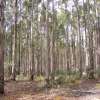
New research demonstrates benefits of trees on farms
Posted 13 May 2025
A new research report, Co-benefits of Trees on Farms, is shedding light on the environmental and economic benefits of planting trees on farms in southeast Australia.
The study, published by Dr Rachelle Meyer from the University of Melbourne, explores how tree planting can support farmers to reduce their operation’s carbon
balance, improve productivity and support sustainability in the face of a changing climate.
It found that planting trees on farms can significantly reduce net carbon emissions over time.
On the high-productivity farms studied as part of the research project, planting trees offset total emissions from between 20% and 33% over the 30-year analysis period.
These reductions are much greater than any that could be achieved by other currently available mitigation options.
This is an important finding for farmers who are facing increasing pressure to reduce their operations emissions to meet market and government sustainability targets, including the Australian Red Meat Industry’s CN30 goal of being carbon neutral by 2030.
Interviews with farmers as part of the study showed that potential return on investment is an important part of the decision to grow trees.
For two of the three case study farms, the research found a 10 per cent annual rate of return was possible.
For the third, the rate of return was between 3 and 7 per cent.
Figures were impacted by factors like how much shelter the trees provided, the quality of pasture replaced by trees and carbon project costs.
A scenario with timber production provided returns that were less variable across differing productivity benefits or carbon project costs.
Dr Rachelle Meyer encourages landowners to consider tree planting as part of an integrated whole-farm plan to maximise these benefits.
‘Given that planting trees is a long-term commitment, it’s important that trees are incorporated in a way that assists in achieving goals on farm,’ says Dr Meyer.
‘This allows for net emissions reductions that are straight-forward since they align with existing farm objectives.
‘Timber revenue can also boost returns. It can change a planting from a cost or a low return to one that is providing a good return.’
For farmers considering tree planting, relevant and reliable information about the benefits and risks is vital to support decision making. Planting trees based on
individual objectives means that farmers can get the most out of their plantations, and realise the many benefits of trees on farms.
To discuss your goals, contact Private Forests Tasmania on 1300 661 009 or email admin@pft.tas.gov.au.
Share this Article
Latest Articles
-

17 September 2025
Celebrating excellence at the Tasmanian Timber Awards
-

17 September 2025
Forest Practices Authority Research Update Day
-

13 August 2025
Have you seen our Stems for CO2 Project signage on the Midlands Highway?
Archives
- ActivAcre hits milestone, calls for more farmers to get on board
- Napier's leading the way in sustainable forestry and carbon-neutral farming
- Sound science needed to assess carbon impacts of timber harvesting
- Newly appointed TFFPN Board of Directors
- Graduate Certificate of Forestry Scholarship
- Forestry Australia Mentoring Program 2025
- Forest Industry Roundtable planning for the long term
- Eagle Management Constraint Period extended
- Successful private native forest management celebrated
- $15 million investment in new ship loader to boost Bell Bay's forestry exports
- Standing with Tasmania's forestry industry: buy local
- TFPA: Tasmanian Freight Equalisation Scheme needs a ground-up review
- AFCA Gala Dinner celebrates industry excellence
- Fire permits now required Statewide
- Forest leaders hone skills in sustainable native regrowth management
- Tasmanian forests and the carbon market: Barriers and opportunities
- Spring is the time for fuel reduction burning
- Primed for Growth: A situation analysis of the Tasmanian Forest and Wood Products Sector
- Audit requirements cut for low-risk plantation projects
- Guidance and support for landowners after damaging winds
- Forestry Australia welcomes further definition of active forest management
- Farm & Forest Mapper Tool highlighted at Rural Youth Tasmania's Young Farmer of the Year competition
- Senate Select Committee inquiry into the Tasmanian Freight Equalisation Scheme
- Timberlink announces new wood composite products brand
- Newly developed protocol a vital tool for safeguarding forestry industry
- Red Hot Tips: Fire management for Tassie farmers
- Bioenergy: Fuelling industries with trees
- Harvesting trees: What you need to know
- Shelterbelts: How are they contributing to farm systems?
- Infill plantings and remnant vegetation: Why biodiversity depends on a thriving understory
- Plantation planning: The key to a successful plantation
- Exciting interactive forestry knowledge hub launched
- $450,000 farm forestry grant recipients revealed



